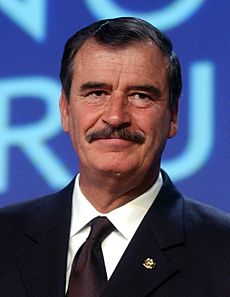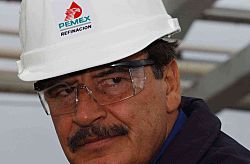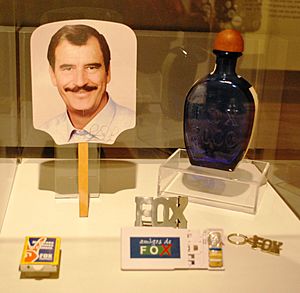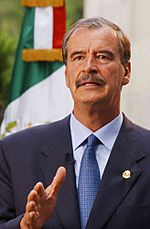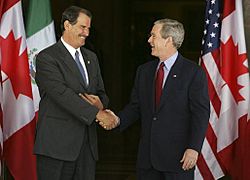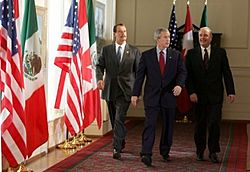Vicente Fox facts for kids
Quick facts for kids
Vicente Fox
|
|
|---|---|
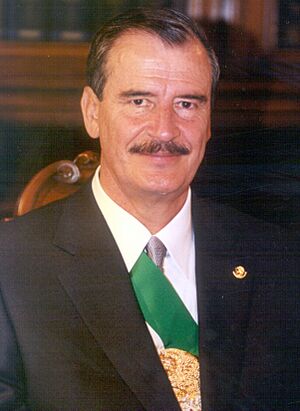
Official portrait, 2000
|
|
| 62nd President of Mexico | |
| In office 1 December 2000 – 30 November 2006 |
|
| Preceded by | Ernesto Zedillo |
| Succeeded by | Felipe Calderón |
| Governor of Guanajuato | |
| In office 26 June 1995 – 7 August 1999 |
|
| Preceded by | Carlos Medina Plascencia |
| Succeeded by | Ramón Martín Huerta |
| Member of the Chamber of Deputies for Guanajuato's 3rd district |
|
| In office 1 September 1988 – 31 August 1991 |
|
| Preceded by | Héctor Hugo Varela Flores |
| Succeeded by | Luis Arturo Torres del Valle |
| Co–President of Centrist Democrat International | |
| Assumed office 1 December 2006 |
|
| Preceded by | Pier Ferdinando Casini |
| Personal details | |
| Born |
Vicente Fox Quesada
2 July 1942 Mexico City, Mexico |
| Political party | Independent (since 2013) |
| Other political affiliations |
National Action Party (until 2013) |
| Spouses | |
| Children | Ana Cristina Fox Rodrigo Fox Paulina Fox Vicente Fox Jr. |
| Parents | José Luis Fox Mercedes Quesada |
| Education | Universidad Iberoamericana (BBA) |
| Occupation | Businessman, politician |
| Signature |  |
Vicente Fox Quesada (born 2 July 1942) is a Mexican businessman and politician. He served as the 62nd president of Mexico from 2000 to 2006. Fox was elected president as a candidate for the National Action Party (PAN) in the 2000 election.
He was the first president not from the Institutional Revolutionary Party (PRI) since 1929. He was also the first elected from an opposition party since Francisco I. Madero in 1911. Fox won the election with 43 percent of the votes.
During his time as president, Fox continued economic policies that focused on free markets. His early years saw strong ties with the United States and President George W. Bush. There were also efforts to change tax laws and build a new airport.
The second half of his presidency included a political disagreement with Andrés Manuel López Obrador, who was the Mayor of Mexico City. Fox's government also had some diplomatic issues with Venezuela and Bolivia. This was because he supported a free trade agreement for the Americas.
His last year in office included the 2006 elections, which were very close. The PAN candidate, Felipe Calderón, was declared the winner by a small number of votes. Fox is remembered for helping the Mexican economy grow and for lowering the poverty rate. The poverty rate went from 43.7% in 2000 to 35.6% in 2006.
After his presidency, Fox went back to his home state of Guanajuato. He gives public speeches and helps with the Vicente Fox Center of Studies, Library and Museum. He is also a co-president of the Centrist Democrat International. This is a group of center-right political parties from around the world. Fox left the PAN party in 2013.
Contents
Early Life and Education
Vicente Fox was born on 2 July 1942 in Mexico City. He was the second of nine children. His father, José Luis Fox Pont, was Mexican. His mother, Mercedes Quesada Etxaide, was from Spain. She was a Basque immigrant.
Fox spent his childhood on his family's ranch in San Francisco del Rincón in Guanajuato. He has polydactyly, which means he has six toes on each foot.
He studied at Campion High School in Wisconsin, USA, where he learned English. Later, he moved to Mexico City to attend the Universidad Iberoamericana. He earned a bachelor's degree in business administration in 1964. In 1974, he also received a certificate in management skills from Harvard Business School.
Business Career
In 1964, Fox started working for the Coca-Cola Company. He began as a route supervisor, driving a delivery truck. After nine years, he became the President and Chief Executive of Coca-Cola Mexico.
During his six years in this role, Coca-Cola became the best-selling soft drink in Mexico. Sales increased by almost 50%. Fox was asked to lead all of Coca-Cola's operations in Latin America, but he decided to leave the company in 1979.
After leaving Coca-Cola, Fox became involved in public activities in Guanajuato. He started an orphanage called "Patronato de la Casa Cuna Amigo Daniel." He also supported the León campus of the Universidad Iberoamericana.
Family Life
In 1969, Fox married Lilian de la Concha. They had four children: Ana Cristina, Vicente, Paulina, and Rodrigo. They divorced in 1990 after 20 years of marriage.
Fox married again on 2 July 2001, while he was President of Mexico. He married Marta María Sahagún Jiménez, who was his spokesperson. The wedding day was also his 59th birthday and the first anniversary of his presidential election. This was the second marriage for both Fox and Sahagún Jiménez.
Early Political Career
Vicente Fox joined the Partido Acción Nacional (PAN) on 1 March 1988. This was with the help of Manuel Clouthier. In the same year, he was elected to the federal Chamber of Deputies. He represented the Third Federal District in León, Guanajuato.
Governor of Guanajuato
In 1991, Fox ran for governor of Guanajuato. He lost that election. However, four years later, he ran again and won by a large margin.
As governor, Fox worked to make the government more efficient and open. He was one of the first governors in Mexico to publicly share his state's financial information. Fox also helped small businesses grow and promoted the sale of goods made in Guanajuato to other countries. He created a system of small loans to help people start their own small shops. Under his leadership, Guanajuato became the fifth most important state economy in Mexico.
Campaign for President
On 7 July 1997, Vicente Fox decided to run for President of Mexico. He secured his candidacy to represent the Alliance for Change. This was a group formed by the National Action Party and the Green Ecological Party of Mexico.
During his campaign, there was a presidential debate. Fox's main opponent, Francisco Labastida, mentioned that Fox had called him a "sissy." Fox's campaign slogans included "¡Ya!" ("Right now!") and "Vota Alianza por el Cambio" ("Vote for Alliance for Change").
Election Results
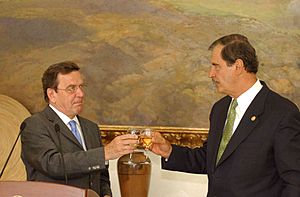
On 2 July 2000, his 58th birthday, Fox won the presidential election. He received 43% of the popular vote. The PRI candidate, Francisco Labastida, came in second with 36%. Cuauhtémoc Cárdenas of the PRD received 17%.
Fox declared victory that night, and then-President Zedillo confirmed it. After the results were announced, President-elect Fox celebrated with thousands of supporters in Mexico City. His opponents accepted the election results later that night. Fox took office on 1 December 2000. This was the first time since 1917 that a candidate from an opposition party became president.
Presidency
Presidential Impact
When Fox won the 2000 election, many Mexicans hoped for big changes. His victory ended over 70 years of rule by the PRI party. However, some people felt that his administration did not make enough progress. They wanted to see more improvements in fighting crime and inequality.
Few major reforms were put into place during his time as president. Fox was seen by some as not being able to push through all the changes he promised. His wife, Marta Sahagún, also had some influence on his decisions.
Fox started his presidency with an 80% approval rating. By the time he left office in 2006, his public image had changed. This was partly due to the very close presidential elections that year.
Historians note that Fox was a better candidate than he was a president. He struggled to lead his cabinet and set clear goals. However, he is seen as a key figure who helped Mexico transition to a more democratic system. He successfully defeated a long-ruling political party.
A survey in 2012 asked people about former presidents. 32% of those asked thought Fox's administration was "very good" or "good." 25% said it was "average," and 42% thought it was "very bad" or "bad."
After the Presidency
Public Speaking and Advocacy
Since leaving office in December 2006, Fox has remained active in public life. He gives speeches in different countries like Nigeria, Canada, and the United States. He talks about topics such as the 2006 election and international relations.
Some people in Mexico have criticized him for being so active after his presidency. Traditionally, former Mexican presidents stay out of the political spotlight. But Fox believes that in a democracy, everyone, even a former president, has the right to speak their mind.
Vicente Fox is also a member of the Global Leadership Foundation. This group offers advice to political leaders facing difficult situations.
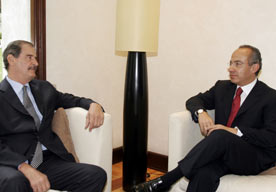
In July 2017, Fox was an international observer for a vote in Venezuela. He compared the vote to the 2000 Mexican elections. He said that the "dictator will leave." The Venezuelan government then declared him a "persona non grata," meaning he was no longer welcome in the country.
In 2018, Fox joined the board of directors for High Times. He left the board in 2020. He supported Javier Milei in the 2023 Argentine general election.
Autobiography
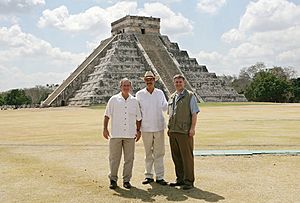
Fox's autobiography, called Revolution of Hope: The Life, Faith and Dreams of a Mexican President, was released in September 2007. He traveled to many U.S. cities to promote his book. During his tour, he faced protests from some Mexican immigrants. They felt his actions had forced them to move to the United States for work.
In an interview, Fox discussed his relationship with U.S. President George W. Bush. He clarified that when he called Bush "cocky" in his book, he meant "confident."
Fox Center of Studies, Library and Museum
- See: Vicente Fox Center of Studies, Library and Museum
On 12 January 2007, Fox announced plans for a center of studies, library, and museum. This project is often called Mexico's first presidential library by the U.S. press. It will include a library, a museum, a center for democracy, a study center, and a hotel. The project is funded entirely by private donations.
It is designed to be like U.S. presidential libraries, such as the Clinton Presidential Center. This will allow Mexicans to access documents, images, and records from his six years as president. The center is being built in Fox's hometown of San Francisco del Rincón in Guanajuato.
The construction of the center, known as "Centro Fox", is ongoing. Fox has stated that the center focuses on ideas, leadership, and strategies. It aims to help young people and provide opportunities for happiness in life. Centro Fox is also working with UST Global to help Mexico become a leader in technology.
Centrist Democratic International
On 20 September 2007, Fox was chosen as a co-president of the Centrist Democrat International. This happened at a meeting in Rome. The CDI is an international group of political parties. Fox's former party, the National Action Party, is a member of this organization.
Health
On 7 August 2021, it was reported that Vicente Fox and his wife, Marta Sahagún, were admitted to a hospital. They had tested positive for COVID-19 during the pandemic in Mexico. However, they did not have severe symptoms.
Honors
 Collar of the Order of the Liberator General San Martín (Argentina)
Collar of the Order of the Liberator General San Martín (Argentina) Grand Cross of the Order of Merit of the Republic of Poland (2004)
Grand Cross of the Order of Merit of the Republic of Poland (2004) Grand Star of the Decoration of Honour for Services to the Republic of Austria (Austria, 2005)
Grand Star of the Decoration of Honour for Services to the Republic of Austria (Austria, 2005) Grand Cross of the Order of Vytautas the Great (Lithuania, 14 January 2002)
Grand Cross of the Order of Vytautas the Great (Lithuania, 14 January 2002) Honorary Knight Grand Cross of the Order of St Michael and St George (United Kingdom)
Honorary Knight Grand Cross of the Order of St Michael and St George (United Kingdom) Collar of the Order of Isabella the Catholic (Spain, 8 November 2002)
Collar of the Order of Isabella the Catholic (Spain, 8 November 2002) Knight of the Royal Order of the Seraphim (Sweden, 22 October 2002)
Knight of the Royal Order of the Seraphim (Sweden, 22 October 2002)
See also
 In Spanish: Vicente Fox para niños
In Spanish: Vicente Fox para niños
- History of Mexico
- List of presidents of Mexico
- Politics of Mexico


